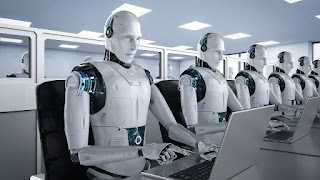AI vs. EI (Will A Robot Steal Your Job?)
Gary Kasparov, the reigning world chess champion, in 1997 played the chess with IBM’s computer known as Deep Blue. Around 500 people are in attendance to watch the live broadcast of the contest.
In the first game, Kasparov wins in 45 moves. He resigns in the second game. Kasparov and Deep Blue reach a draw in the third, fourth and fifth games. After the sixth game, the score is equal. The victory will be decided by the final battle. Kasparov repeats his opening moves from game 4 but eventually, it the human grand master who is forced to resign after few than twenty moves. This was the first time a reigning World Chess Champion losing to a computer.
Will AI displace human jobs?
45% of our daily work activities could be automated using technology that we already have access to i.e., AI will displace many human jobs. Thus, we are heading for a conflict between Artificial Intelligence (AI) and Emotional Intelligence (EI).
Or can humans have the opportunity to redesign our working life and unlock more of our unique human potential?
AI does not sleep!
A group of Oxford Scientists evaluated the likelihood of various professions being displaced by automation. The jobs related to economics and accountancy were deemed to be most at risk. While AI promises a tireless, reliable, less error prone worker, in addition, robot do not sleep, and do not get sick. Thus, human cannot compete with robots in terms of efficiency.
Now the question of “how likely is it that jobs will be replaced by automation?” Which human skills will become the most important?
A recent survey discovered that the most valuable skills that we human being need to have is our increased focus on STEM (Science, Technology, Engineering and Mathematics) skills. The second is the ‘soft skills’ such as the one associated with person’s Emotional Intelligence (EI). Also, ‘service orientation’ i.e., actively looking for ways to help people and ‘originality’ i.e., creating problem solving and capacity to generate unusual ideas are some of the skills identified as least ‘automatable’.
Therefore, organisations that can create an environment to develop and maintain human high-performance, with an emphasis on these features that are more difficult to emulate artificially, will possess a powerful competitive advantage.
So how can we develop these soft skills and creative characteristics?
1. Unlocking human potential
Robots work very well when they are switched on, fixed in a place and left alone, but self-focus makes humans weaker and less resilient. Humans need more than fuel for optimum performance. The driving force that the happier workers use the time they have more effectively, increasing the pace at which they work without sacrificing quality. Thus, the growing body of evidence demonstrates that EI, wellbeing and positive relationships are the foundations and precursors for improved human health and performance.
2. Inspired employees are the most productive
EI inspires, casts vision and emphasizes the meaning in the work. A study (as per jamjeshewitt.net) asserts that one inspired employee can generate the same output as 2.25 satisfied employees. Thus, EI helps us to create happy, healthy, high-performing teams.
3. Enhance and multiply your performance
The application and the development of our EI, discovering meaning and purpose, prioritizing our health and wellbeing, improving our ways of working and social interactions, enhance and multiply our performance can be established in four ways:
· Physically: We increase strength and cardiovascular health, reduce inflammation, reduce stress makers and boost our immune system.
· Psychologically: We improve emotional balance and resilience, regardless of circumstances.
· Socially: We strengthen existing relationships, build higher quality relationships, boost co-worker’s productivity, improve workplace commitment, increase engagement and provide superior customer service.
· Intellectually: We learn faster, think more creatively and can better resolve challenging situations.
Where is Kasparov now?
Garry Kasparov retired from professional chess on 10th March, 2005 and redirected his focus towards politics and writing. He inspires others to take lessons from the chess and apply them to improve our lives.
It is often viewed that the time to be left to the robots to ensure efficiency, while human use EI and become truly effective, unleash our originality and actively search for ways to serve and inspire each other, multiplying and amplifying our performance. This can be done through our unique human contribution.





Will review your comment and get back!